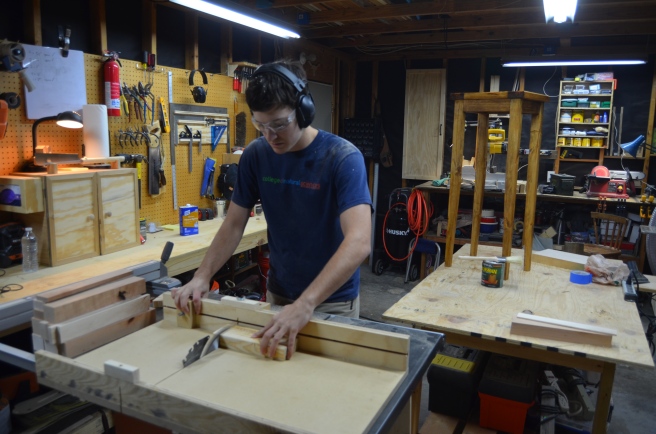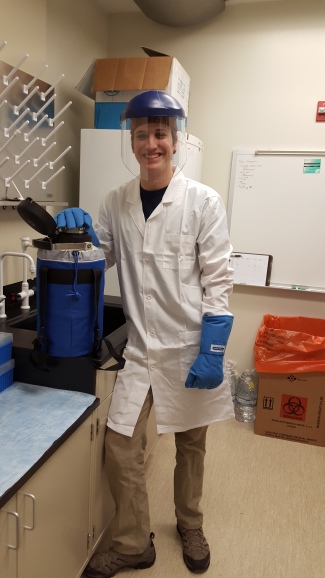
After spending all four years in the Freshman Research Initiative, Dalton Burch graduated this spring with a Bachelor’s of Science in Biochemistry. He worked as a researcher, a mentor, and a TA for the Nanomaterials for Chemical Catalysis Stream, becoming a leader through his inclusive nature and passion for the research. Burch spent his entire undergraduate career, including all three summers, with the Nano Stream.
After spending over 1,500 hours in lab, Burch played a part in most of the projects in the Nano Stream, as well as his own independent research. For his own work, Burch studied bimetallic nanoparticles, comparing different ratios of two metals to find out which would give the best catalytic performance, known as a synergistic effect. Even with a full lab schedule, Burch still found time to prepare presentations for middle school students during the summer, and to support the student researchers in his charge as a mentor and then a teaching assistant.
Dr. Stacia Rodenbusch, the Research Educator for the Nano Stream, thinks that Burch “really likes running the show.” Rodenbusch asked Burch to join her stream as a freshman, after watching him work with other students in his research methods class. “He was really engaged and active,” she said, adding that “he has always been one of the most outgoing, inclusive people in the group.”
After graduation, Burch started looking for jobs in the start-up realm, searching for a small company that he would be able to grow with. Burch also wanted a post that would challenge him, saying that “that’s the way I’ve been groomed in the FRI, to want to think about the big problems.”
Burch got his break when he received an e-mail from the University with two potential jobs, one for the Texas Alcohol and Beverages Committee, and another for a brand new start-up AptamiR Therapeutics: he applied to both. By this point, Burch had learned that most job openings were inundated with applicants after even a few days online, so he made it a habit to check listings every six hours, and tried to apply for openings no more than two days old. This time, it worked out.
AptamiR extended a position as a research assistant after an extensive interview process which took from mid-July to the end of September. In the meantime, Burch worked as a tool rental technician at Home Depot. “Basically, my entire job … was fixing things that people would bring in,” he said.
Burch’s knowledge of mechanics and woodworking helped him in lab as well. Dr. Rodenbusch remembers a point during Burch’s time in the lab when he designed and made bottle holders to organize containers in the fume hood, which the Nano Stream still uses today. “[Dalton] embodies that attitude of ‘okay, here’s what I need, I’m going to just make it happen,” she said.
When he started work at AptamiR, Burch was relieved. “Nothing against Home Depot,” he said, “but it’s not a biotechnology company.”

Now, Burch takes the commute to AptamiR’s North Austin lab in the morning, taking advantage of flexible hours to beat the traffic. He checks on the freezer and current projects, then meets with the lab’s research associate, also a recent UT graduate, to plan out what is needed for the day. As it turns out, the first few months of a startup are learning experiences in networking. Agents need to be ordered, equipment checked and new contacts made.
So far, Burch is grateful that he learned to read primary literature during his undergraduate years. Most of the research he does can’t be found in textbooks, it’s too new. So knowing how to do primary literature searches, reading review articles, and going through references has helped Burch to navigate a new field of expertise. “While I don’t have a map,” Burch said, “now I at least have a compass.”
The startup is working create microRNA-based treatments that target fat cells, which it hopes can be used to combat obesity. Burch enjoys focusing on the issue, which affects quality of life in the US and worldwide. “The problems at work don’t feel like problems, because it doesn’t feel like work,” he said.
Starting his new career hasn’t lessened Burch’s passion for the FRI. Burch still returns to have lunch with friends and check on the lab where he spent so much time while he was here. Looking forward, Burch entertains the possibility of becoming a research educator for the FRI or an equivalent program at another university. Dr. Rodenbusch thinks that Burch would be an excellent choice for the position, explaining that his experience in industry will help students interested in careers outside of academia develop their perspectives. He still hasn’t ruled out working in industry however, saying that “it is nice to get paid for something that you love to do.”
Kate Thackrey
UT Journalism Student
Look for a new Faces of FRI feature the first friday of every month to learn about current and former exemplary FRI students.
